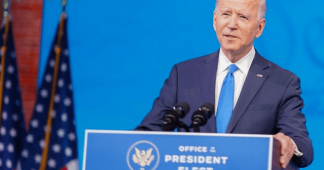Matthew Petti
Apr. 9, 2021
The Biden administration has removed the overseas contingency operations fund from the Pentagon budget in a victory for pro-restraint activists.
For years, U.S. wars abroad have been funded through the OCO account, a “slush fund” worth tens of billion dollars per year that is not subject to the same oversight as the rest of the military budget. But in a reversal of years of U.S. military policy, the Biden administration’s first defense budget request will close the OCO account.
While the wars will still be financed through other parts of the defense budget, experts cautiously hailed the move as a step towards accountability and restraint.
Defense Priorities policy director Ben Friedman was skeptical of how much the move would accomplish.
The OCO account “has been this way that the Pentagon and its friends in Congress have gotten around the caps” under the Budget Control Act of 2011, which had set limits on the normal military budget until 2021, explained Friedman during a Thursday night discussion on the voice chat app Clubhouse..
Now that the budget caps are expiring, “it’s a little unclear what OCO was accomplishing for people anymore,” he said.
Forcing the military to fund its wars the normal way, however, adds a layer of much-needed accountability, according to Erica Fein, advocacy directory at Win Without War.
The use of “accounting gimmicks…enables the growth of the base budget, and it enables obscuring the cost of war,” she said during the same Clubhouse discussion. “It’s important to get these gimmicks off the books, regardless of whether they’ll be used in the same way.”
“It would have been better a few years ago, but it’s still a good thing today,” she added.
The OCO account had been created in 2001 to finance U.S. operations in Afghanistan, later growing as the “War on Terror” expanded to Iraq and beyond. The fund grew far beyond even its intended purposes as military leaders used it to plug up gaps in their budget they wouldn’t otherwise have been able to fill.
In the fiscal year 2020, the Pentagon had asked Congress for $165 billion in OCO funding. Only 15 percent of those funds was meant for missions in Afghanistan, Iraq, and Syria.
That year, the House Appropriations Committee reported that “the OCO experiment has been an abject failure and has given the [Department of Defense] a budgetary relief valve that has allowed it to avoid making difficult decisions.”
“OCO has become almost totally disconnected from its original purpose of supporting unanticipated, emergency, or difficult-to-plan costs for operations in Iraq and Afghanistan as both Congress and the Department of Defense have used the funds to support base budget needs,” Mandy Smithberger, Center for Defense Information at the Project On Government Oversight, testified to the committee last month.
She hailed the Biden administration’s move in a Friday email to Responsible Statecraft.
“I think it’s an important and overdue step to get rid of OCO. This shouldn’t come at the cost of being transparent of what we’re paying for our wars, but abuse of that fund has helped to contribute to endless and wasteful spending,” Smithberger wrote. “I just wish the Biden administration had extended the spirit of reform to reevaluating the entire Pentagon budget.”
Rep. Ilhan Omar (D–Minn.) similarly praised the move while criticizing the overall size of the budget.
“It is simply inexcusable to continue to shower weapons manufacturers with hundreds of billions of dollars in Pentagon waste,” she said in a statement. “While I support the elimination of the Overseas Contingency Fund—a slush fund used to further military engagement abroad—an increase of tens of billions of dollars in Pentagon spending, much of which will be spent on war, is simply inexcusable. …We as a nation should be prioritizing peace and human rights over militarism,” Omar concluded.
Published at responsiblestatecraft.org











